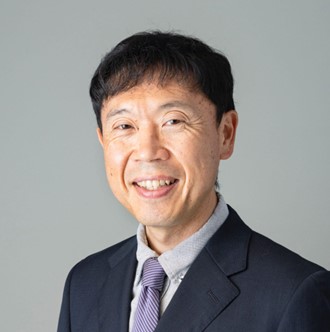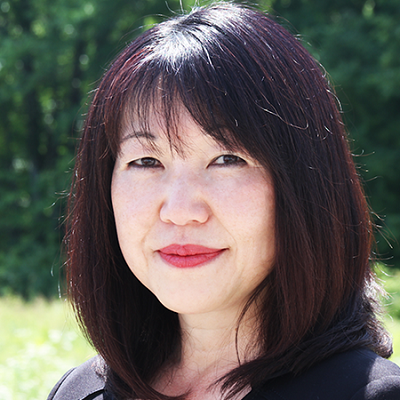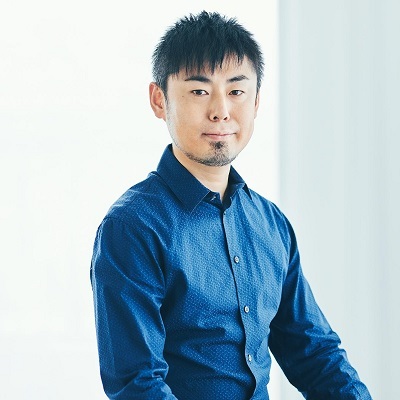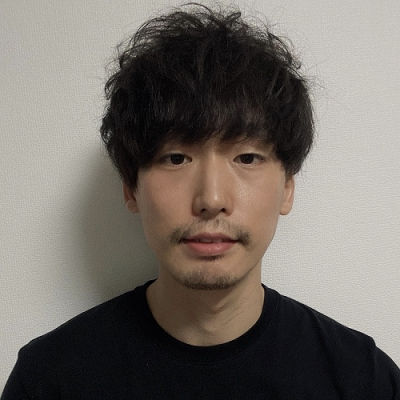2023 & 2024 Japan SEO Predictions: 6 Japanese Experts Give their opinions about SEO Trends
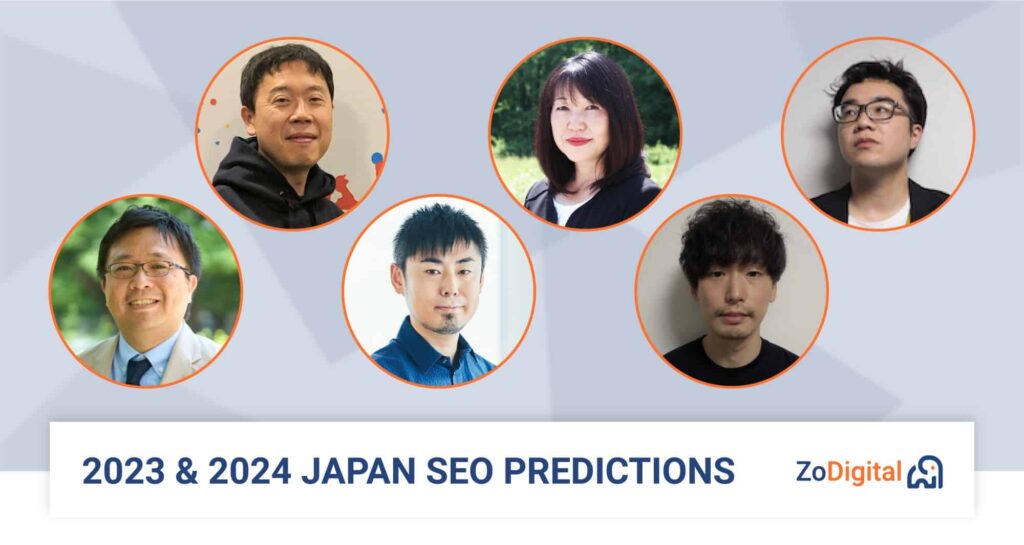
In this article we asked some of the most influential Japanese SEOs their forecasts and trends for 2023, and heading into 2024.
When we did this survey back in 2021, almost all our experts expressed the importance of having good EAT, Expertise, Authority and Trust. Well, those predictions turned out to be accurate. In the last 2 years, many website and content producers have had to revise their strategies to account for this new dynamic.

So what will happen in 2023 and 2024? Read on.
In this article, you can learn more about hot topics such as Google updates, EEAT, branded versus general keywords, and more. Our experts commented on AI tools such as ChatGPT and Bard, and what is the effect on search results, as well as SEO best practices in 2023.
Our esteemed panel includes experts such as,
- Kenichi Suzuki, whose SEO blog is read by thousands of people each day.
- Noriaki Ito, the CEO of JADE, a well known SEO agency in Japan.
- Motoko Hunt, a Japanese SEO expert who is quoted in many English SEO publications.
- Shigeki Matsuo, who authored a best selling SEO book, and started a content marketing agency.
- Masaharu Hayataki, a global marketing director for a company based in Japan and noted blog author.
- Shomei Omoto, who does SEO for a major active apparel brand.
This is truly an impressive panel.
For this survey, we asked our experts their opinions on the following topics:
- What were the important Google algorithm updates in 2022. How has SEO changed in Japan?
- What direction do you think SEO will take in 2023? What do you think will be the most effective SEO measures/technologies in Japan in 2023?
- How do you think AI will impact SEO in the future?
Read on to find out what the experts have to say.
Kenichi Suzuki
Overseas SEO information blog Author,
Faber Company Co.Ltd. Director Search Advocate
Kenichi Suzuki might be considered the most famous SEO expert in Japan. His Overseas Information Blog (海外SEOブログ) gets about 8,000 visits month (per AHRefs), and is read by almost everyone in the industry.
Suzuki-san is Search Advocate of Faber Company, Inc. His mission is to teach webmasters how to do SEO correctly. His main role at Faber Company is to cover search-related conferences/events and teach at seminars. Recently, he has also been a speaker at overseas conferences. He is certified as a Product Expert in Google’s official Search Central Help Community and is well connected with Google employees.
Q1. There were many important updates in 2022. How has SEO changed in Japan?
The major updates announced by Google in 2022 that also affect content in Japanese were:
- February 22, 2022: Updates to the desktop page experience
- May 25, 2022: Core Update
- September 12, 2022: Core Update
- October 19, 2022: Spam update
- December 5, 2022: Helpful content update *Introduced in English on August 25
- December 14, 2022: Link Spam Update
There were no shocking ranking updates last year. Globally, the trend is the same, and although there were some big movements in some areas, it seems that there were many updates that were relatively calm overall.
I think this is evidence that Google’s algorithms have become more sophisticated. As it stands now, it’s good to know that searches are returning relevant and high-quality content, and they are doing additional updates to make search results even better.
We expect this trend to continue in the future, and we don’t expect a single update to completely change search rankings. With a user-first stance, you will be able to maintain stability in search by steadily providing only relevant and high-quality content.
Q2. What direction do you think SEO will take in 2023? What do you think will be the most effective SEO measures/technologies in Japan in 2023?
Over the past few years, Google has become more and more focused on reliability. What you should be aware of here is not “What factors does Google judge reliability based on?”, but rather “How can visitors trust you?”
For example, the following information can be included on a dedicated author bio page:
- Full name of the Author
- Photograph
- Career information
- Achievements, Publication, Articles on the Web
- Qualifications, Awards
- Social media accounts
- Mission
Content based on real-life experiences is also useful. Reliability can be improved by using not only text but also images and videos depending on the content.
Another initiative is improving the user experience. I believe that improvements in all aspects of a site’s user experience, not just the user experience signals that Google currently ranks, will ultimately lead to Google’s ranking.
Q3. How do you think ChatGPT will affect SEO in the future?
Not only for ChatGPT, there are many concerns about the mass production of low quality content by abusing AI (which is actually happening). While Google will do its best to deal with it, someone will likely slip through the cracks and engage in spam-like techniques to disrupt search results, even if only for a short period of time.
At this time, we want to make good use of AI as a support role, rather than leaving it to do all the work.
Noriaki Ito
COO / CEO of JADE
Noriaki Ito is CEO of JADE, which is one of the top SEO Agencies in Japan.
Born in Nara Prefecture in 1975. Joined NKB Co., Ltd. in 2000. Since 2004, he has participated in the launch and operation of a regional information site jointly operated with Tokyo Metro.
He joined Gurunavi Co., Ltd. in October 2007. He served as an executive officer in the area of SEO and social media measures, web analysis, content marketing, advertising, and public relations.
Q1. There were many important updates in 2022. How has SEO changed in Japan?
The major Google algorithm updates last year are, the Core Algorithm Update in May 2022 and the helpful Content Update (HCU), which was announced in August 2022, and later applied to Japan.
The former is a site-by-site (host-by-host) type, and the latter is a type that evaluates on a site-by-site basis as a result of accumulating evaluations on a page-by-page basis.
Recently, there has been an increase in the number of so-called “parasitic sites” that focus on this site-by-site evaluation and borrow specific directories under the domain name to develop contents that are not related to the original business of the site. Examples are medical, beauty, and finance-related contents (sites with high transactional intent).
However, the accuracy of Google’s detection and ranking adjustment of such content has improved. We believe the period of time these sites can rank has shortened considerably.
In terms of domestic consumer search behavior, as the effect of the Corona Virus settles down, it will be important to turn back to the predictable changes into opportunities, such as a rebound from the special demand for e-commerce, increased demand for outings, travel, and dining out, and a renewed boom in inbound tourism.
At the same time, focusing on new habits that have taken root after Corona (e.g., the stability of the takeout market) is a perspective that should be kept in mind. It can double as a source of revenue and hedge against risk in a contingency such as Corona Virus.
Q2. What direction do you think SEO will take in 2023? What do you think will be the most effective SEO measures/technologies in Japan in 2023?
The first is the gradual increase in Microsoft Bing’s search market share, as some companies that sell SaaS in the B2B space are often targeting Bing users via Edge, the default browser on company-supplied PCs.
In the so-called “DX Trend”, the digitization of legacy companies will continue, and startups that support this trend will also continue to emerge. Bing’s speedy response to interactive search will also help it increase its market share.
Bing’s Webmaster Tools includes an SEO report that includes some oddities. Bing’s Webmaster Tools has a report called SEO Report, and while some of the items are odd, we think it is reasonable to start by addressing the improvements found here.
The second is to take advantage of the recently launched direct export function from Search Console to BigQuery, which requires some time and effort to connect to Google Cloud Platform. However, we believe that more and more people will start using BigQuery for SEO purposes, which has been a bit difficult to do in the past. The amount of query data that can be retrieved is much larger than when connecting directly to the Search Console API, making it easier to get hints for measures and measure their effectiveness. We are also in the process of testing this feature, but we expect that its use will increase in the future.
Motoko Hunt
President, International Search Marketing Consulting
AJPR LLC (www.ajpr.com)
Motoko is another famous SEO expert, not just in Japan but the international community as well.
Since Motoko established AJPR in 1998, her SEO/SEM consulting services with her extensive knowledge of Asia and Japanese markets have made a big impact on some of the world’s popular multinational brands’ SEO/SEM campaigns.
She writes about International SEO and SEM for several online and printed media including Search Engine Journal & Search Engine Watch. She is a frequent speaker at the search conferences globally such as PubCon, and is a member of the judges panel of the Global Search Awards.
Q1. There were many important updates in 2022. How has SEO changed in Japan?
The frequency of Google updates has increased over the past few years, and at the same time, many updates are being rolled out globally from the beginning, not just in English-speaking countries. Therefore, it is no longer possible to respond to the updates by referencing the effects and countermeasures taken in other countries where the updates rolled out.
In order to minimize the negative effects of any updates and to enable early recovery, it is necessary not only to follow the SEO best practices on a daily basis but also to have a system in place that can constantly monitor site data, quickly detect the effects, analyze the causes, and make improvements.
It is good to see that more and more companies are focusing on tasks other than the site and content optimization, such as what tasks can be automated or simplified with the introduction of tools and how SEO can be integrated into internal processes to improve efficiency, rather than simply increasing staffing levels.
Q2. What direction do you think SEO will take in 2023? What do you think will be the most effective SEO measures/technologies in Japan in 2023?
The best way to ensure efficient and effective SEO is to use the best practices in both technical-SEO and contents, by taking Google’s current algorithms into account. This may sound obvious, but not many companies are actually doing this.
In addition, you need to stay on top of trends in your target market and reflect them in your content and conversion plans. No matter how much you invest in content creation, it will be meaningless if the number of conversions does not increase in parallel with the number of clicks. If there is no growth, it should be assumed that there is a gap between the content users are looking for and the content you have created.
In addition, more and more Japanese company sites are operating non-Japanese language sites, but there are many sites that do not pay any attention to global SEO. Taking measures to improve the performance of your websites targeting overseas markets is also a shortcut to increasing the ROI of your website and making it more profitable.
Q3. How do you think ChatGPT will affect SEO in the future?
While there are many ways that ChatGPT can be helpful, especially in terms of content, treating it as a mere content creation tool and simply uploading what ChatGPT spits out on to your site is not going to work. Unfortunately, there are already sites using ChatGPT in this way, and we expect to see more of them in the future.
If agencies promote this kind of usage, I fear that more clients will question the effectiveness of SEO itself.
Just as Google has come to provide instantaneous answers in search results, such as temperature and currency conversions, I think it is better to use ChatGPT to get sufficient information quickly for some simple questions. As a result, the number of people visiting the site for such searches may decrease. The key is to determine the information that can only be provided by professionals in a particular industry which is worth providing. It’s important to focus on creating content that sets you apart from the competition.
With Bing and ChatGPT and now with Google’s Bard, more AI-generated information will be incorporated and the search results will continue to evolve. These changes will be welcomed by the search users as they can quickly find the information they are looking for. For the last several years, the keyword-based optimization strategies have become outdated. If your website still relies on the keyword-based SEO program, you will fall further behind. The importance of incorporating SEO into the content creation process is becoming increasingly bigger.
Mr. Shigeki Matsuo
Representative of Web Rider Co., Ltd.
Web Rider Co., Ltd. (https://web-rider.jp/Lives in)
After graduating from Kwansei Gakuin University with a degree in economics, Shigeoki Matsuo worked for a music production company, where he was involved in the production of stage music. He then went independent and established Web Rider Inc. in 2010.
In addition to supporting web consulting and content creation for many companies, ranging from listed companies to small and medium enterprises, he also leads marketing for his own businesses, including “Bunken”.
Major contents he has produced include “Silence Web Writing,” “Silence Web Marketing,” “A Wonderful Gift,” “Good Wine,” and “Betters. The Silence series has been published as a book and has sold over 210,000 copies including e-books.
As a composer and piano player, he has provided music for PR events for the “National Cultural Festival Kyoto” and Kibune Shrine in Kyoto. In addition to being active as a Voicy personality, he has spoken at many seminars on marketing and writing.
Q1. There were many important updates in 2022. How has SEO changed in Japan?
With the Helpful Content Update rolling out to Japan at the end of the year, we feel that more emphasis is being placed on the convenience of content for website visitors.
We also feel that there has been a gradual response from Google’s algorithms to the case where sites try to improve their rankings by renting sub-directories or sub-domains within highly trusted domains.
Given both of these trends, we expect to see a further decline in the evaluation of sites that attempt to hack the search engines.
Q2. What direction do you think SEO will take in 2023? What do you think will be the most effective SEO measures/technologies in Japan in 2023?
As mentioned above, creating useful content and site design for search users will become more important.
However, since the quality of content across the Internet has improved to a certain degree, not only the quality of content, but also the credibility of the site, domain, and brand is becoming more important.
Therefore, it will be important to increase brand and site recognition and to increase the inflow of visitors via search.
It is important to take marketing actions not only for the sake of SEO, but also to become “the chosen one” or “the one searched for”.
For example, as a result of using advertisements, a brand may gain recognition, and as a result of an increase in the number of searches for the brand word, there may be an increase in the number of other search terms that result in an influx of visitors.
This means that the domain name and site have been evaluated as the brand of choice by consumers = a trusted brand, and the domain name and site as a whole have been evaluated more highly.
SEO originally stands for “Search Engine Optimization” and refers to technical adjustments to ensure that a site is read correctly, but please be aware that in order to be evaluated by search engines, the above thinking is also necessary.
Q3. How do you think ChatGPT will affect SEO in the future?
In terms of opinions from content production sites, ChatGPT is like a “file” (or rasp) that raises the level of content production to the next level, and a “seasoning” that adds a little flavor to content.
When you want to hone the quality of your content, ChatGPT may make it easier to summarize or gather some information.
However, it is necessary to check the authenticity of the information obtained by ChatGPT, and to rewrite the generated sentences.
Therefore, it is important not to place excessive expectations on ChatGPT, and to face the creation of content that is close to users, as in the past.
Masaharu Hayataki
Global Marketing Director of Inedo Japan, LLC
Masaharu Hayataki is the global marketing director at Inedo Japan. He also supports overseas companies with expansion into Japan. He has experience in SEO, SNS, Sales, blogging at Todoist, and helping many other overseas companies.
Hayataki-san has his own blog.
Q1. There were many important updates in 2022. How has SEO changed in Japan?
We didn’t see a game-changing update in 2022. Since about 2010, search engines have been changing constantly. The goal is to improve the search engine user’s search experience by finding fresher, higher quality information and providing it in a form that is easier to consume. For example, medical information with high E-A-T (Expertise, Authoritativeness, and Trustworthiness) is now displayed as a Medical Information Panel.
Q2-A. What direction do you think SEO will take in 2023?
Search Engine Providers (Google, Microsoft, Yandex, etc) probably have 2 long term strategies.
1. Improve the search engine user experience.
A good search experience is the fastest way to find the information you are looking for. Users do not care how many backlinks a page has. E-A-T and personalized search are examples of this.
2. Keep users on your platform longer.
Search engines are in the advertising business, and they make money when users see and act on ads. In the extreme, they do not want users to click on non-advertised search results. Therefore, for keywords that have few ads, they will create a system where the answer can be found on the search engine (i.e., not clicked on, so the user is more likely to stay on the search engine). Knowledge panels, PAAs, medical information panels, etc. are examples of this..
1 and 2 don’t already go together. In addition, keeping users on their platform can cause controversy. Australia has already passed a world-first law aimed at making Google and Facebook pay for news content on their platforms in 2021.
Q2-B. What do you think will be the most effective SEO measures/technologies in Japan in 2023?
SEO for “keywords with zero search volume” will be effective, although risky.
It has been 10 years since Brian Dean proposed the “Skyscraper Technique” in 2013. Since then, search engines have become a red ocean for companies looking to mass produce high quality content.
With ChatGPT and crowdsourcing, low-quality content is mass-produced more than ever. And there will be more investment in measures to improve content quality. Keywords with high search volume will become more of a “red ocean”.
Therefore, many companies, especially tech companies, will move toward creating new concepts and nurturing the keywords they create. For example, “ChatGPT optimization” and “SKC (Search Keyword Creation)” may become buzzwords in the SEO community.
It takes a lot of hard work to establish a new keyword or concept in the marketplace. 99% of new keywords will slip. Of the remaining 1%, 99% will only buzz for a year.
Smaller companies should focus on producing content that is valuable to their customers, not worrying about SEO; writing one more article is more effective than staring at SEO tools and Google Analytics and making a few percent improvement.
Q3. How do you think ChatGPT will affect SEO in the future?
This can be considered on two fronts. One is how people’s searches will change. The second is how SEO will change in response.
How will search change?
Most industries will not be affected much, although some believe that Google’s interactive AI Bard and ChatGPT will change the way people search.
Searching, more abstractly, is the act of seeking information.
With search engines, we input keywords, and with ChatGPT, we input sentences or phrases to seek answers. Therefore, the search intent can be input in more detail. Therefore, the answers that match the intent are more likely to be returned. But actually, that is a rare case.
For example, if you are looking for a café near Shinjuku station, it is more convenient to search in the map UI and get an answer in the map UI instead of in a sentence. Generation Z enjoys the act of searching itself with video and Instagram searches.
Search engines also allow you to input sentences and phrases, but as regular users of Google Keyword Planner know, few people do long form searches. This is likely because that is simply enough for many people.
The agencies that will be greatly affected will be those that offer special skills, such as SEO agencies, and explain in text, as in this article, that they have those skills. Articles like this one will be replaced by ChatGPT. Then, one of those channels to attract customers will shrink. On the other hand, graphic design is also an agency that offers special skills, but it is not affected because it uses graphics rather than text to prove its skills.
However, the SEO agency market itself will not shrink because ChatGPT provides advice but not hands-on work.
How will SEO change?
The production of SEO content will be largely unaffected. Low quality content can already be mass produced at low cost using crowdsourcing sites, and even lower cost using ChatGPT, but if the quality is low, it will be completely useless. Whether there are a hundred or a million more articles that rank below 20 in the search results, people will see them because they are within the Top-10 search results.
So how should companies respond?
SEO has always been a labor-intensive, medium- to long-term marketing strategy. You should focus on solidly improving the quality of your content.
Shohei Omoto
Operator of the Heysho Website http://heysho.com
Shohei Omoto is an up-and-comer in the SEO industry in Japan.
He works as a manager of the SEO and Content Team at a foreign-affiliated company in Tokyo in the apparel space. His areas of expertise include SEO, UX Research, Web Production, blogging, Google Analytics, Notion and Microsoft Team. He has been working on the web since 2012.
Q1. There were many important updates in 2022. How has SEO changed in Japan?
The changes I have noticed in recent years are as follows,
- The frequency of Google updates has increased over time.
- Meta-titles have become more short and concise (fewer sites now include catchphrases in their meta-titles, which used to be the case in Japan).
- Clicks on big general keywords have decreased (due to an increase in the display of videos and SNS snippets in SERPs).
- In some cases, indexing has become slower.
- etc.
My impression is Domain Authority (or Strength) and the importance of EAT seems unchanged from recent trends.
In terms of updates, I was interested in the Product Reviews Update, the Helpful Content Update, and the addition of the new “E” for Experience to the “EEAT” acronym.
I sense a strong intent from Google to gather more dense content such as expert advice, research data, shared experiences, and review articles.
Q2. What direction do you think SEO will take in 2023? What do you think will be the most effective SEO measures/technologies in Japan in 2023?
There is a difference between named (branded) keyword measures performed by a company with an established brand, and general (non-branded) keyword measures aimed at new user acquisition. So I will consider them separately.
Named (branded) keyword strategy remains the same as before (AI).
- Increase the number of named searches through branding
- Optimized of the user experience (UX elements) for the branded search.
It seems that the strategy for general keywords will become difficult in the future.
The method of posting articles that cover the topic with a strong domain and attracting entry-level customers from general words,
The future is uncertain as zero clicks style search results increase.
The spread of ChatGPT and Bard is likely to further accelerate this trend.
Sites that are successful in general keyword SEO/content marketing should focus on lead generation while they still have search traffic.
Q3. How do you think ChatGPT will affect SEO in the future?
The direct impacts that can be predicted so far are:
- Fewer people will use Google search
- More people will use AI writing tools such as ChatGPT for content creation
etc.
As for changes in search results,
- The share of snippets of AI responses will increase for general keywords.
- Organic listings will be lined with research, testimonials, review articles, etc.
As for my own actions,
- Confirm how ChatGPT can be utilized in concrete terms (paying special attention to duplicate content)
- Check the Terms of Use of each tool and the guidelines of the media used to attract customers (in particular, check the security and information leakage risks associated with commercial use).
- Check which keywords remain in demand in Google searches (check for keywords that cannot be covered by Chat GPT/Bard)
We would like to take a careful approach while studying these issues.
Summary & Takeaways
Trends
- Google is getting better and better with more relevant results
- The frequency of Google Updates is increasing. There are more incremental updates than before.
- Google is relying on EAT factors such as “Trust”.
- There is a rise of so-called “Parasitic Sites”.
- Rise of borrowed sub-domains or sub-folders.
- With Covid coming to a close, we will see a rebound of dining-out and travel sites
- “DX” or “Digital Transformation” trend in Japan continues.
Impacts of AI
- We will see a surge in mass production of low quality content, generated by AI or outsourcing. For some topics, it will be too difficult to differentiate your brand from others.
- We will see a big change in Search Engine experience. It will be more Interactive. Users will get a more rich search experience.
- As a result, users will spend more time on search engine platforms, and perhaps less time on your site.
- We see the resurgence in Bing as a Search Engine. Bing webmaster tools can provide good insight.
Message to SEO Professionals
- You need to understand the impact of Google algorithms. In particular the Helpful Content Update.
- Content production is still important in 2023.
- However, be careful not to be overly dependent on AI tools. You still need to apply subject matter expertise or experience (EAT) to contents. You need to check the authenticity of the AI generated content.
- You need to understand and use the right tools to accomplish SEO Tasks. One example is BigQuery, another example is AI tools.
- You need to focus on things that cannot be copied by AI (Graphics,Tools)
- Continue to focus on “EAT” (now called “EEAT”).
- You need to focus not only on contents, but also technical SEO aspects of the site as well.
- You need to focus on Site & Brand factors as well. Need to have a strong brand.
- You need to stay on top of the latest SEO trends
What happens in the future for SEO? We don’t know for sure. It seems 2023 is the most uncertain year in decades. However, our experts have good knowledge of SEO and know where the market is going. We would be wise to listen to what they say.
About the Author Jeff Crawford
Jeff Crawford is a Digital Marketing expert, technologist and Manager. He has worked for technology companies in Silicon Valley such as Apple, WebTV and Microsoft. He has lived in Tokyo Japan since 2004, working for companies such as Microsoft KK and Adobe Systems Japan. Jeff is founder of Zo Digital Japan, an SEO and Digital Marketing agency based in Tokyo. Jeff started the Tokyo Digital Marketers Meetup in 2016, which now has over 2000 members. He has also presented about Digital Marketing at such events as Ad-Tech Tokyo, WordCamp Tokyo, Japan Market Expansion Competition (JMEC), and the Japan Association of Translators (JAT).

